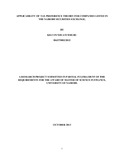| dc.description.abstract | The aim of this study was to determine applicability of tax preference theory for companies listed in the Nairobi securities exchange (NSE).The study was anchored on the following study objectives; to establish the effect of taxes on the supply of dividends in the listed companies, to establish the effect of taxes on capital gains in the listed companies, to establish how taxes affect firm value among the listed companies , and also to establish how tax advantages of capital gains over dividends predispose investors among the listed companies. The research used both descriptive and quantitative research design. The target population constituted all companies quoted at the NSE for the period of five years from 2008 to 2012. The study used both primary and secondary data collection methods. An inferential statistical technique was also used to analyze the data. The data from the field was analyzed by use of statistical packages for social sciences (SPSS). The study concluded that tax is an important determinant in the financial performance of companies listed in the Nairobi Securities Exchange. The financial performance of the companies is linked to taxation through dividend tax rate, capital gains tax rate, and corporate tax rate. Dividend tax rate influences the dividends that the firms pay to the shareholders. Capital gains tax rate and corporate tax rate affects the value of the firm and they also affect final dividend paid to the shareholders. Implementation of policies that increases dividend tax rate, capital gains tax rate, and corporate tax rate lead to decreased financial performance of companies listed in the Nairobi Securities Exchange. Higher taxes on capital hinder the growth of investment and capital stock. The decrease in capital reduces economic growth which, in turn, lead to higher unemployment and reduced personal income. | en |

